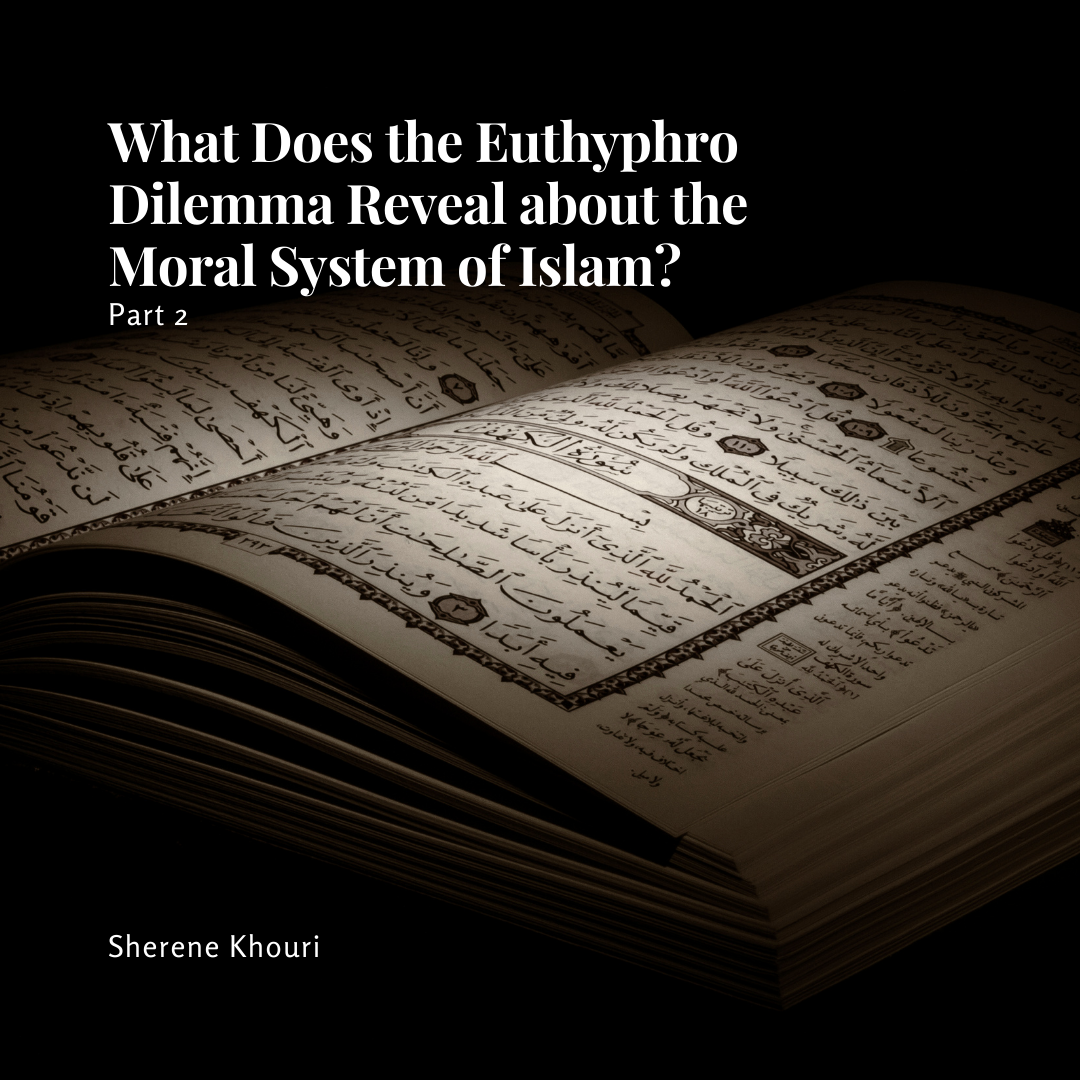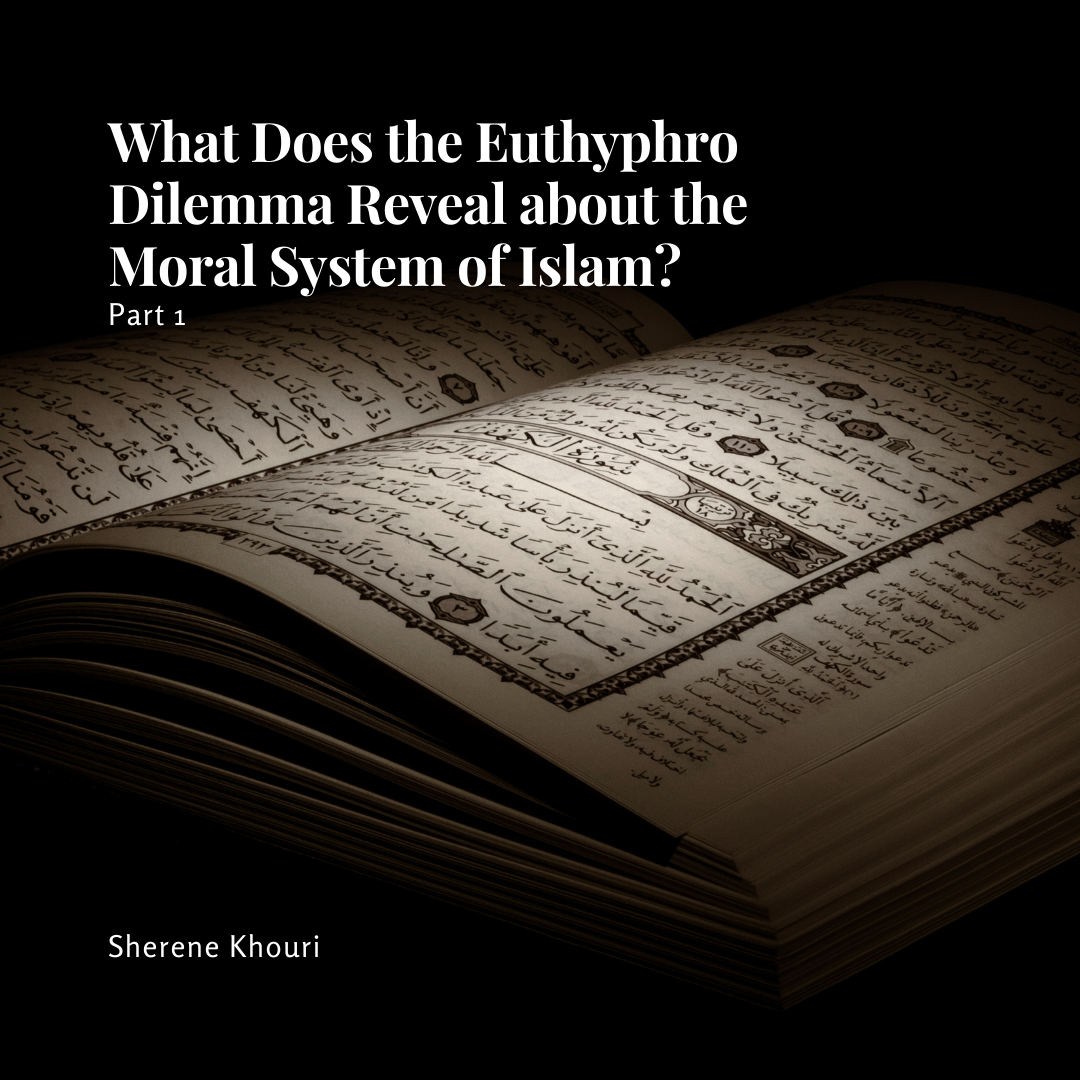What Does the Euthyphro Dilemma Reveal about the Moral System of Islam? Part 2
/A second example about divine subjectivity in Islam is the story of Zaynab bent Jahsh. Zaynab was prophet Mohammad’s first cousin. He wanted her to marry his adopted son, Zayd bin Haritha. In the beginning, Zaynab and her family refused this marriage because of the low social status of Zayd. Allah had to interfere to defend Zayd by giving Mohammad Surah 33:36 “It is not for a believer, man or woman, when Allah and His Messenger have decreed a matter that they should have any option in their decision. And whoever disobeys Allah and His Messenger, he has indeed strayed into a plain error.” This verse gives Mohammad a great authority—similar to the authority of Allah himself. Zaynab finally accepts and marries Zayd.
According to Islamic sources, after some time, prophet Mohammad sees Zaynab and is captivated by her beauty. Zayd takes notice and asks Mohammad if he should divorce her. Ibn Ishaq writes Zayd’s question: “Should I divorce her for you, O Prophet of Allah? The Prophet says no, then Surah 33:37 came down and Allah’s command was accomplished.”[1] This is to say that after Zayd had married Zaynab, Allah issued another command to allow prophet Mohammad to marry Zaynab. “But when Zayd had accomplished his want of her, We [Allah] gave her to you [Mohammad] as a wife, so that there should be no difficulty for the believers in respect of the wives of their adopted sons, when they have accomplished their want of them; and Allah's command shall be performed.” In other words, Allah issues a command for Zayd to marry Zaynab, then he changes it by issuing another command having Zayd to divorce her and allowing Mohammad to marry her.
This incident might have several social and psychological implications for Muslim women; however, for present purposes, we will concentrate on Allah’s command. This story shows that Allah’s truth is not objective or final. His commands alter to accommodate a private situation. At one point he instructs Zaynab to marry Zayd, and at a later time, he orders her to marry the prophet himself. It seems as if Allah is accommodating the preference of his prophet (playing favoritism), or he is changing his mind and commands based on new circumstances.
Allah’s command changed regarding adoption as well. Both Sunni and Shi’ite scholars agree that adoption is prohibited in Islam. They rely on Surah 33:5 in their legislation, “Nor has He (Allâh) made your adopted sons your sons. Such is (only) your (manner of) speech by your mouths. But God tells the truth, and He shows the way. Call them by (the names of) their fathers, that is better in the sight of God.”[2] Zayd was Mohammad’s adopted son until Mohammad fell in love with Zaynab and asked her to marry him. At that point, Allah changed his decree and declared adoption is wrong.
This is another example which shows morality is subjective in Islam because it is completely dependent on Allah’s commands. His discretion changes with time, and also his decree. While morality is due to Allah’s fiat, it is grounded in his mutable nature. Thus, it is subjective, and Allah’s commands seem to benefit some [the prophet] and dismiss others [like Zaynab].
The Divine Command Theory reveals a great weakness in Allah’s moral character because his commands look arbitrary. There is no reason to think that Allah will not issue an abhorrent command simply because he can make right and good bad or vice versa. In the example of adoption, Mohammad adopted Zayd because adoption was good, but then Allah changed his discretion and made adoption bad. Consequently, Mohammad forbids it. The Judeo-Christian worldview, on the other hand, believes that “the moral truth in question would be a reflection of his [God] very nature, upheld by his faithfulness to it in this and all possible circumstances. It’s potentially a veridical window of insight into an aspect of his own holy and loving character. To issue a command at variance with it would be to deny himself, which God simply can’t do.”[3] God in Christianity cannot deny himself; he is restrained by his ultimate goodness because he is the Good. God does not change his mind; whatever he pronounces as good and right remains unchanging because of the immutable good nature of God.
In the Judeo-Christian faith, morality is based on the good nature of God, not on “no reason” for God’s command nor for the benefit of certain people. God has reasons for each command and the reasons are based on his loving nature. The command “to love your neighbor as yourself” resonates with God’s relational character. God in the Judeo-Christian faith wants to establish a relationship with all humanity, not only certain people—who obey him blindly.
[1] Muhammad Ibn Ishaq Al-Matlbi, Kitab al-Siyar wa-l-Maghazi (Damascus, Syria: Dar al-Fikir, 1978), 262.
[2] Sayyid Muhammad Rizvi, "Dear Maulana Questions" section of Shama newsletter (Vancouver, B.C., Canada) 1990, accessed January 24, 2021. URL: https://www.al-islam.org/articles/adoption-islam-sayyid-muhammad-rizvi. Dar al-Ifta Al-Missiyyah, “Is it permissible for an unmarried woman adopt a child?,” accessed January 24, 2021. URL: https://www.dar-alifta.org/Foreign/ViewFatwa.aspx?ID=4845.
[3] David Baggett & Jerry Walls, Good God: The Theistic Foundations of Morality (Oxford University Press, 2011), 131.
Sherene Khouri was born into a religiously diverse family in Damascus, Syria. She became a believer when she was 11 years old. Sherene and her husband were missionaries in Saudi Arabia. Their house was open for meetings and they were involved with the locals until the government knew about their ministry and gave them three days’ notice to leave the country. In 2006, they went back to Syria and started serving the Lord with RZIM International ministry. They travel around the Middle Eastern region—Turkey, Jordan, Egypt, Lebanon, Syria, and United Arab Emirates. Sherene was also involved in her local church among the young youth, young adults, and women’s ministry. In 2013, the civil war broke out in Syria. Sherene and her husband’s car was vandalized 3 times and they had to immigrate to the United States of America. In 2019, Shere became an American citizen.
Sherene holds a Ph.D. candidate in Apologetics and Theology at Liberty University. She holds a Master of Art in Christian Apologetics from Liberty University and a Bachelor of Science in Biblical Studies from Moody Bible Institute. She is also working on a Master of Theology in Global Studies at Liberty University. Her specialty is answering Islamic objections to the Christian faith.













